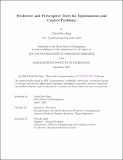| dc.contributor.advisor | Bertsimas, Dimitris J. | |
| dc.contributor.author | Kim, Cheol Woo | |
| dc.date.accessioned | 2024-10-02T17:30:57Z | |
| dc.date.available | 2024-10-02T17:30:57Z | |
| dc.date.issued | 2024-09 | |
| dc.date.submitted | 2024-09-04T00:43:13.166Z | |
| dc.identifier.uri | https://hdl.handle.net/1721.1/157107 | |
| dc.description.abstract | This thesis introduces novel methods to expedite the solution of a broad range of optimization and control problems using machine learning, specifically decision tree algorithms. In many practical settings, similar optimization and control problems often need to be solved repeatedly. We propose methods to leverage patterns from pre-solved problem instances using machine learning, leading to drastically faster solutions once training is complete.
The thesis is structured into four parts, each tackling different class of optimization or control problems. In Chapter 2, we propose a machine learning approach to the optimal control of multiclass fluid queueing networks (MFQNETs). We prove that a piecewise constant optimal policy exists for MFQNET control problems, with segments separated by hyperplanes passing through the origin. We use Optimal Classification Trees with hyperplane splits (OCT-H) to learn an optimal control policy for MFQNETs.
In Chapter 3, we study fluid restless multi-armed bandits (FRMABs), deriving fundamental properties and designing efficient numerical algorithms. Using these results, we learn state feedback policies with OCT-H and introduce a novel feature augmentation technique to handle nonlinearities.
In Chapter 4, we propose a machine learning framework for solving two-stage linear adaptive robust optimization problems with binary here-and-now decisions and polyhedral uncertainty sets. We also introduce novel methods to expedite training data generation and reduce the number of different target classes the machine learning algorithm needs to be trained on.
In Chapter 5, we introduce a prescriptive machine learning approach to speed up the process of solving mixed integer convex optimization (MICO) problems. We use a prescriptive machine learning algorithm, Optimal Policy Trees (OPT), instead of more commonly used classification algorithms. We demonstrate that OPT-based methods have a significant advantage in finding feasible solutions compared to classification algorithms.
We test our approach on various synthetic and real-world problems. Using the proposed methods, we can obtain high-quality solutions to a broad range of large-scale optimization and control problems in real-time – within milliseconds. | |
| dc.publisher | Massachusetts Institute of Technology | |
| dc.rights | Attribution-NonCommercial-NoDerivatives 4.0 International (CC BY-NC-ND 4.0) | |
| dc.rights | Copyright retained by author(s) | |
| dc.rights.uri | https://creativecommons.org/licenses/by-nc-nd/4.0/ | |
| dc.title | Predictive and Prescriptive Trees for Optimization and Control Problems | |
| dc.type | Thesis | |
| dc.description.degree | Ph.D. | |
| dc.contributor.department | Massachusetts Institute of Technology. Operations Research Center | |
| mit.thesis.degree | Doctoral | |
| thesis.degree.name | Doctor of Philosophy | |
